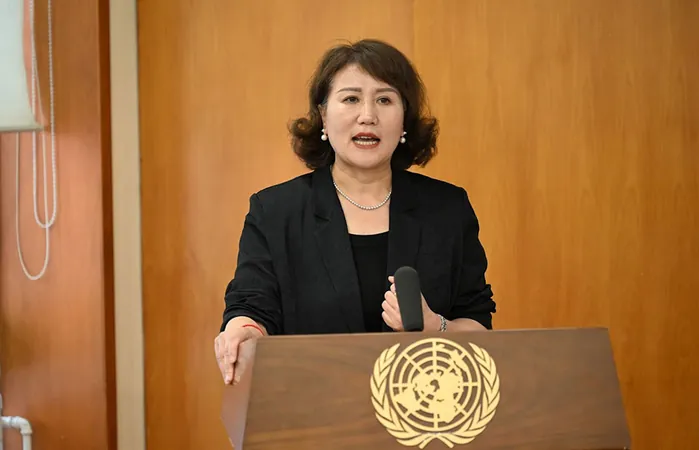
Empowering Women Living with HIV: A Fight Against Stigma in China
2024-10-14
Author: Ming
Introduction
In China, approximately 1.4 million individuals are living with HIV, with women accounting for about 23.7% of this population. This statistic highlights a pressing issue, especially as pregnant women face unique challenges associated with societal stigma and discrimination against those carrying the virus.
The Voice of Resilience Event
To combat this prejudice, a powerful gathering of women living with HIV and Hepatitis B recently took place at The Voice of Resilience event. Here, these brave women shared their personal journeys and called for increased resources for Community-Based Organizations (CBOs) that provide crucial support to those impacted by HIV.
Recent HIV Statistics
In 2023, over 5,000 pregnant women were newly diagnosed with HIV, alongside more than 400,000 cases of hepatitis B. Alarmingly, many received diagnosis at advanced stages, making it difficult for them to access critical services to prevent mother-to-child transmission. Despite existing healthcare services aimed at mitigating these risks, pervasive discrimination prevents many women from seeking necessary medical care.
Personal Story: Xia Jing
One poignant story comes from Xia Jing, who faced rejection from a hospital during a routine check-up due to her HIV status. “I received a call from the doctor telling me that I couldn’t receive services from their hospital because I was HIV positive,” she recalled, still shaken by the experience. Despite this, she stood her ground and informed the doctor that the law protected her rights. Ultimately, she was directed to You'an Hospital in Beijing, where she successfully gave birth to a healthy boy. With support from professionals like Dr. Zhu Yunxia, who has dedicated over three decades to maternal healthcare, Xia now enjoys motherhood and advocates for empathy toward women living with HIV.
Stigma and Public Health
“This stigma impedes public health goals by creating barriers to health services and diminishing the quality of care for affected individuals,” stated Mark Vcislo, the First Secretary at the Canadian Embassy to China. Emphasizing the need to dismantle prejudices, he noted that marginalized communities, including those with HIV, deserve access to the healthcare they require.
The Role of Community-Based Organizations
CBOs play an essential role in supporting women living with HIV. Sister Xin, a survivor herself, has been a beacon of hope by establishing Firefly, a CBO that has assisted over 20,000 women in the last two decades. “CBOs are struggling for survival due to lack of resources,” lamented Zhang Yu, who leads a CBO in Yunnan Province. She urged for greater support from government agencies and charitable organizations to ensure their vital work continues.
Government Initiatives and Progress
China has made significant strides in reducing the transmission rates of HIV, syphilis, and hepatitis B, as outlined in the China Women’s Development Plan and Healthy China 2030 initiative. Impressively, nearly 99% of pregnant women living with HIV have undergone screening in the last five years, with over 9 million pregnant women receiving HIV testing services in 2023 alone.
Community-Centered Care Model
In collaboration with UN agencies, the Chinese government has developed a holistic community-centered care model to provide integrated services, breaking down barriers for mothers and infants alike.
Conclusion
“Thanks to advancements in technology and social reforms, women living with HIV can now confidently give birth to healthy babies,” says Sister Xin, highlighting the positive impact of community support and ongoing advocacy efforts. While the road ahead remains challenging, the unity and resilience of women living with HIV in China serve as powerful reminders of the change that is possible when communities come together to confront stigma and support one another in the face of adversity.


 Brasil (PT)
Brasil (PT)
 Canada (EN)
Canada (EN)
 Chile (ES)
Chile (ES)
 España (ES)
España (ES)
 France (FR)
France (FR)
 Hong Kong (EN)
Hong Kong (EN)
 Italia (IT)
Italia (IT)
 日本 (JA)
日本 (JA)
 Magyarország (HU)
Magyarország (HU)
 Norge (NO)
Norge (NO)
 Polska (PL)
Polska (PL)
 Schweiz (DE)
Schweiz (DE)
 Singapore (EN)
Singapore (EN)
 Sverige (SV)
Sverige (SV)
 Suomi (FI)
Suomi (FI)
 Türkiye (TR)
Türkiye (TR)